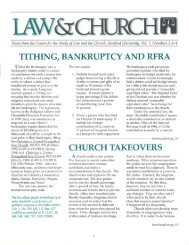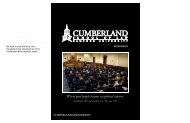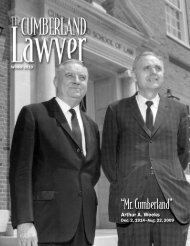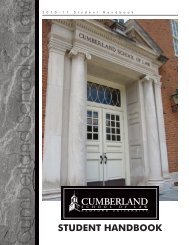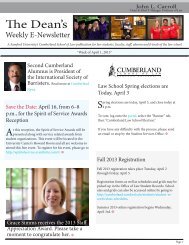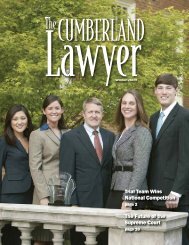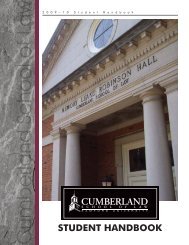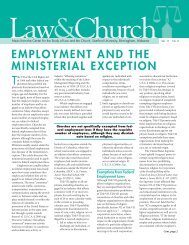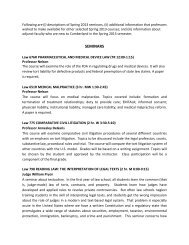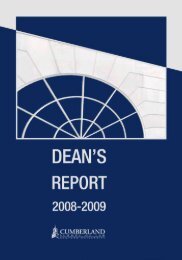Fall 2008 - Cumberland School of Law - Samford University
Fall 2008 - Cumberland School of Law - Samford University
Fall 2008 - Cumberland School of Law - Samford University
You also want an ePaper? Increase the reach of your titles
YUMPU automatically turns print PDFs into web optimized ePapers that Google loves.
IV. Current Program Status and<br />
Future Activities<br />
The M.C.L. Program has progressed constructively<br />
more than anticipated by either<br />
the <strong>Cumberland</strong> <strong>School</strong> <strong>of</strong> <strong>Law</strong> faculty or<br />
administration.The value <strong>of</strong> the project, like<br />
other educational efforts, will not be fully<br />
appreciated until the necessary time has<br />
lapsed. One can, however, currently appreciate<br />
how numerous <strong>Samford</strong> law graduates<br />
have gained an awareness <strong>of</strong> civil law concepts<br />
and established both personal and<br />
pr<strong>of</strong>essional friendships with the international<br />
students as a result <strong>of</strong> the program.<br />
Further, this writer can attest to the manner<br />
in which M.C.L. Program participation has<br />
enhanced the pr<strong>of</strong>essional careers <strong>of</strong> both<br />
the prosecutors and judges who have successfully<br />
completed the program.<br />
There are numerous Brazilian judiciary<br />
institutional benefits which could be<br />
asserted; however, two obvious and very<br />
important benefits should be highlighted.<br />
First, an alternative dispute resolution<br />
programmatic emphasis has been implemented<br />
in Brazil by two M.C.L. graduates.<br />
Desembargadora M. Cristina Zucchi, an<br />
appellate justice on the São Paulo Supreme<br />
Court, teaches the concept and program<br />
implementation at the Judges College in<br />
São Paulo and Juiz Daniel Issler, a trial<br />
judge in São Paulo State, has designed and<br />
now directs an ADR program for juveniles.<br />
Second, as a direct result <strong>of</strong> M.C.L.<br />
candidates gaining an awareness <strong>of</strong> the use<br />
<strong>of</strong> legal precedent in the American legal<br />
culture and Cole’s numerous lectures concerning<br />
the concept and practice applicable<br />
to the use <strong>of</strong> precedent in the American<br />
legal culture, Brazil’s constitution now provides<br />
authority for the Brazilian Supreme<br />
Court to establish precedent when deciding<br />
constitutional cases. 9 Admittedly, the constitutional<br />
authority <strong>of</strong> the Brazilian Supreme<br />
Court to elect to establish precedent when<br />
deciding constitutional cases is very different<br />
from the use <strong>of</strong> precedent in U.S.<br />
federal and state courts. Even so, the concept<br />
has been introduced to the Brazilian<br />
judicial system and can <strong>of</strong>fer stability to the<br />
aspects <strong>of</strong> the system where precedents are<br />
utilized. 10 The reader may be surprised to<br />
learn that Brazilian courts do not follow<br />
precedent generally.Thus, the limited availability<br />
<strong>of</strong> the precedent concept in Brazil in<br />
constitutional cases will allow the Brazilian<br />
judiciary to witness the stability available<br />
from the use <strong>of</strong> precedent in their judicial<br />
system and, perhaps, expand use <strong>of</strong> the<br />
concept in Brazil’s justice system.<br />
Success in both designing and implementing<br />
the program in Brazil has been<br />
further enhanced by establishment <strong>of</strong> a<br />
<strong>Cumberland</strong> Alumni Chapter in São Paulo<br />
City.The association held its organizational<br />
meeting in São Paulo in November 2007 in<br />
combination with Cole’s invitation to <strong>of</strong>fer<br />
lectures to federal trial and appellate<br />
courts. 11 The presence <strong>of</strong> a <strong>Cumberland</strong><br />
Alumni Chapter in São Paulo must be<br />
looked upon, both within and without our<br />
university community, as an enhancement<br />
to the <strong>Samford</strong> <strong>University</strong> reputation<br />
domestically and internationally.<br />
The M.C.L. Program was designed to<br />
require a minimum expense for implementation,<br />
relying heavily on existing courses<br />
<strong>of</strong>fered in the regular curriculum and a<br />
minimum number <strong>of</strong> courses specially created<br />
for the M.C.L. candidates. Should the<br />
decision be made to expand either the<br />
number <strong>of</strong> candidates or countries from<br />
which candidates are accepted it will be<br />
necessary to dedicate additional resources to<br />
the program.<br />
A strategy <strong>Samford</strong> could consider to<br />
create a broader base for constructive<br />
activity, without a large additional financial<br />
commitment, is joining with one or more<br />
similar private universities to make the<br />
benefits <strong>of</strong> the <strong>Samford</strong> program available<br />
to other countries. Such an approach would<br />
provide a means for <strong>Samford</strong>’s leadership in<br />
this area to be recognized, though shared,<br />
but at a reasonable budgetary impact.<br />
V. Conclusion<br />
<strong>Samford</strong>’s M.C.L. Program is a success and,<br />
though limited in geographic scope and<br />
numbers <strong>of</strong> candidates matriculating, is<br />
truly an international outreach program.<br />
The continued success <strong>of</strong> the program is<br />
limited only by future administrative<br />
decisions to provide necessary funding and<br />
institutional interest.The relatively small<br />
budgetary impact for additional program<br />
emphasis will be greatly <strong>of</strong>fset by the recognition<br />
to be gained by <strong>Samford</strong> for constructive<br />
pro bono participation in international<br />
legal education.The benefit <strong>of</strong> the<br />
M.C.L. Program to the graduates and their<br />
home countries, as well as providing<br />
student body diversity to <strong>Cumberland</strong><br />
<strong>School</strong> <strong>of</strong> <strong>Law</strong>, more than justifies continuation<br />
<strong>of</strong> the program in the manner<br />
that institutional policy ultimately supports.<br />
21<br />
Endnotes<br />
*B.S. 1960,Auburn <strong>University</strong>; J.D., cum laude, 1966,<br />
<strong>Cumberland</strong> <strong>School</strong> <strong>of</strong> <strong>Law</strong>, <strong>Samford</strong> <strong>University</strong>;<br />
LL.M. 1971, NewYork <strong>University</strong>; Beeson Pr<strong>of</strong>essor <strong>of</strong><br />
<strong>Law</strong>, <strong>Cumberland</strong> <strong>School</strong> <strong>of</strong> <strong>Law</strong>, Director,<br />
<strong>Cumberland</strong> <strong>School</strong> <strong>of</strong> <strong>Law</strong> Study-Abroad Programs<br />
and the Master <strong>of</strong> Comparative <strong>Law</strong> Program.The<br />
author would like to thank Ms.Anna F. Kinman for<br />
her very competent administrative aid.<br />
1 Black’s <strong>Law</strong> Dictionary 1363 (4th ed. 1972).<br />
2 Cole presented four papers at the 1988 São Paulo<br />
Conference and has, at the time this article is being<br />
compiled, published 25 papers and books which have<br />
been presented at numerous locations in Brazil.<br />
3 The Brazilian visitors to the <strong>Samford</strong> <strong>University</strong><br />
campus, as guests <strong>of</strong> the <strong>University</strong>, were lawyers, law<br />
pr<strong>of</strong>essors, prosecutors, and federal and state judges, at<br />
both the trial and appellate levels <strong>of</strong> court.<br />
4 The M.C.L. Faculty Advisory Committee is a<br />
permanent committee <strong>of</strong> the <strong>Law</strong> <strong>School</strong> Governance<br />
Document.The committee is composed <strong>of</strong> the<br />
program director and six members <strong>of</strong> the faculty.The<br />
committee for academic year 2007–08 is composed <strong>of</strong><br />
Cole, ex <strong>of</strong>ficio chair as M.C.L. Program director, and<br />
Pr<strong>of</strong>essors Thomas B. Bishop,Alexander J. Bolla,<br />
Robert J. Goodwin, Paul Kuruk,William G. Ross and<br />
Belle H. Stoddard.<br />
5 M.C.L. candidates have been required to complete<br />
courses at Birmingham which teach legal analysis and<br />
research and writing in the American legal culture.<br />
Legal Process, an introduction to the American justice<br />
systems with emphasis upon analysis <strong>of</strong> cases to utilize<br />
and understand precedent, was created specifically for<br />
the M.C.L. Program, as was the Legal Research and<br />
Writing for International Scholars course, currently<br />
taught by Pr<strong>of</strong>essor Belle Stoddard.After completion<br />
<strong>of</strong> the required courses the candidates take courses<br />
<strong>of</strong>fered in <strong>Cumberland</strong> <strong>School</strong> <strong>of</strong> <strong>Law</strong>’s summer<br />
curriculum in Birmingham and in the study-abroad<br />
programs in England and Brazil.The courses have<br />
included Comparative Constitutional <strong>Law</strong>,<br />
International Human Rights <strong>Law</strong>, Comparative Trial<br />
Systems,Alternative Dispute Resolution, International<br />
Environmental <strong>Law</strong>, Pr<strong>of</strong>essional Responsibility,<br />
International Business Transactions, European Union<br />
<strong>Law</strong>, Intellectual Property, European Union <strong>Law</strong> and<br />
Mercosur, Equitable Remedies, and, among others,<br />
World Trading System.<br />
6 Juiz José Thales Sena Reboucas, a São Paulo State<br />
Trial Judge, now retired, obtained the M.C.L. degree<br />
in 1999.<br />
7 The graduates include a Federal appellate judge, six<br />
State appellate justices, seven State trial judges, four<br />
State prosecutors, nine law pr<strong>of</strong>essors/lawyers, all from<br />
Brazil, and a director <strong>of</strong> legal services in Manila,<br />
Philippines. Sixty-nine candidates have been accepted<br />
for M.C.L. matriculation, 30 have graduated and there<br />
are currently 17 active candidates. Five thesis submissions<br />
are anticipated during academic year <strong>2008</strong>–09.<br />
8 The 19 M.C.L. students currently matriculating<br />
through the program include two federal trial judges,<br />
seven state trial judges, and 10 law pr<strong>of</strong>essors/lawyers.<br />
9 See Amendment 45 (2004), formally cited as C.F.,<br />
amend. 45 (2004).<br />
10 This author is not so presumptuous that he will take<br />
total credit for the introduction <strong>of</strong> the precedent<br />
concept to Brazil; however, the opportunity <strong>Samford</strong><br />
provided for M.C.L. candidates to become familiar<br />
with the precedent concept in the U.S. and Cole’s<br />
numerous presentations and legal publications in Brazil<br />
concerning the concept were helpful.<br />
11 Cole presented a paper entitled “Binding Precedent<br />
in the United States with Comment Concerning<br />
Amendment 45 <strong>of</strong> Brazil’s Constitution,” which was<br />
written for presentation to the federal trial and<br />
appellate courts in São Paulo and will be published by<br />
the TRIBUNAL REGIONAL FEDERAL DA 3 a<br />
REGIÃO, São Paulo.



